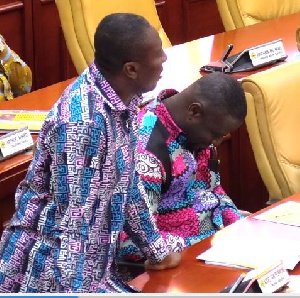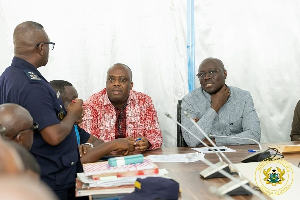Board Chair of the Ghana Water Company Limited(GWCL), Alexander Afenyo-Markin, has stated that treating water in Ghana has become more costly due to some on-going illicit activities happening in and around water bodies in the country.
Addressing Members of Parliament, Afenyo-Markin disclosed that government does not subsidize the treatment of water adding that GWCL solely generates funds to enable it undertake such activity.
Government was commended for lifting the 22-month ban on small-scale mining and rolling out robust reforms to sanitise the mining sector.
This paved the way for eligible small-scale mining companies to return to work on Monday, December 17, 2018.
However, assertions from the GWCL Chairman reveals that the menace has not entirely stopped as water bodies keep being contaminated.
He further indicated that although galamsey activities were brought to a control, reducing the cost of water treatments, he said galamsey is on the rise again.
While pointing out the effect on lives, Afenyo-Markin said, “It is costing Ghana Water more money in treating water because of the unprecedented contamination of our water bodies. When the galamsey activities were brought to some control, the cost of treatment reduced but it is suddenly rising and it is affecting us. Not only the cost of treatment but some other dangerous chemicals that are left in our water bodies asa result of illegal mining activities can affect our health”.
According to a report by the United Nations (UN), Access to safe, affordable and reliable drinking water and sanitation services are basic human rights yet, billions still lack these facilities. The report underscores that exclusion, discrimination, poverty and inequalities are among the main obstacles to achieving the water-related goals of the 2030 Agenda for Sustainable Development.
While the wealthy generally receive high levels of service at low prices, the poor often pay a much higher price for services of similar, or lesser quality.
As part of the efforts to support this course, the Effutu MP urged his colleagues in parliament to support the fight against galamsey by talking “about the effects of galamsey in our various communities so that water supply will be sustained to enable us achieve agenda 2030”.
General News of Friday, 22 March 2019
Source: www.ghanaweb.com













